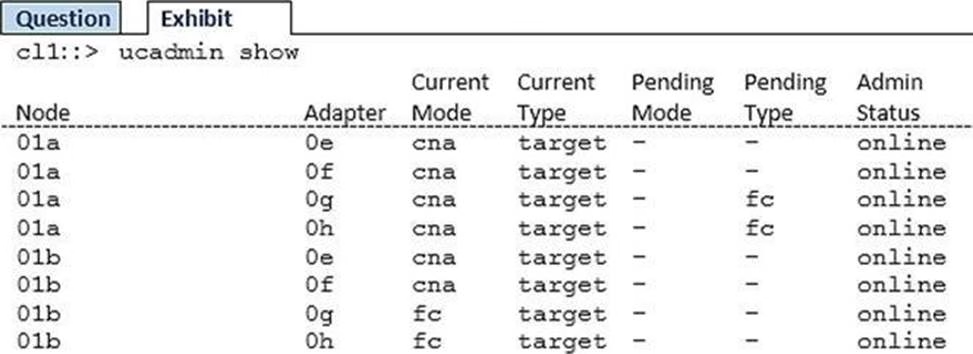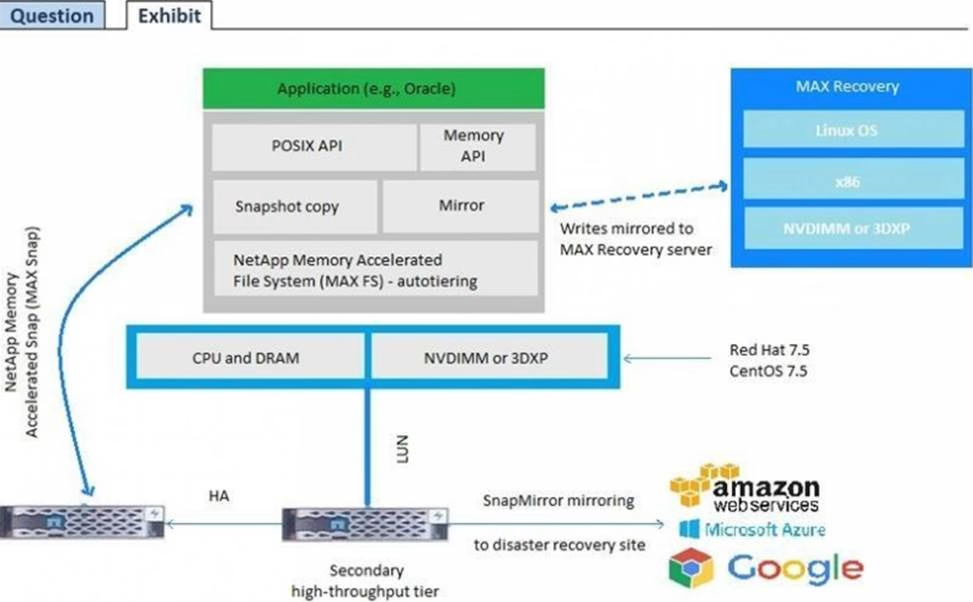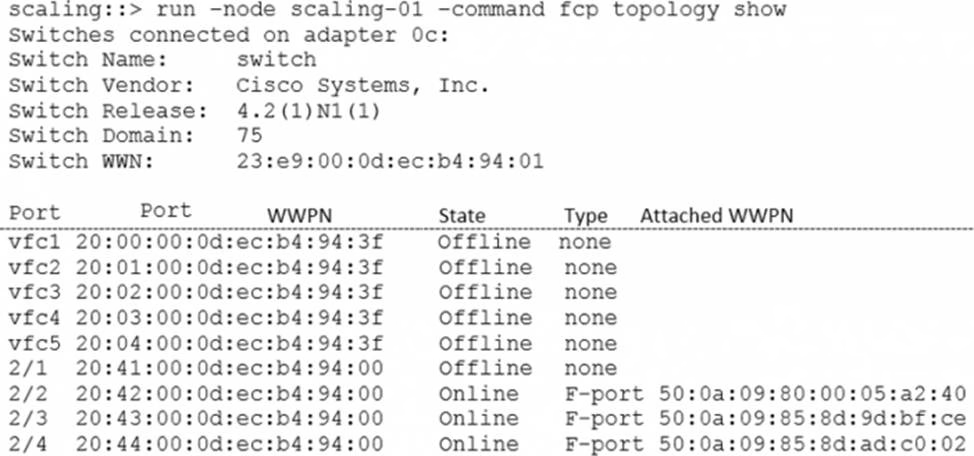Network Appliance NS0-520 NetApp Certified Implementation Engineer – SAN, ONTAP Online Training
Network Appliance NS0-520 Online Training
The questions for NS0-520 were last updated at Feb 28,2026.
- Exam Code: NS0-520
- Exam Name: NetApp Certified Implementation Engineer - SAN, ONTAP
- Certification Provider: Network Appliance
- Latest update: Feb 28,2026
You are asked to serve iSCSI LUNs in an existing SVM on your AFF A220 using ONTAP 9.5. You verified that the iSCSI license is configured on your cluster and that the iSCSI protocol is enabled.

Referring to the exhibit, what is needed to allow hosts to log into the iSCSI target?
- A . Create new LIFs with the iSCSI data protocol.
- B . Create new igroups with the host IQNs.
- C . Add iSCSI to the data protocol of the existing LIFs.
- D . Map LUNs to the igroups.
You are testing iSCSI LUN failover across a 4-node FAS9000 fabric-attached MetroCluster configuration.
In this scenario, which front end configuration is required for non-disruptive host LUN failover between sites?
- A . an interclassed LIF
- B . a stretched Layer 2 network
- C . Ipv6
- D . a stretched VSAN
Referring to the exhibit, which two pairs of ports are currently configurable as FC SAN LIFs? (Choose two.)

- A . 01b, 0h
- B . 01a, 0g
- C . 01a, 0h
- D . 01b, 0g
You have a 4-node cluster with an AFF A300 HA pair and a FAS8200 HA pair. You plan on using the default storage efficiency settings. With inline data compaction, you estimate that you can save 6% of storage space. AFF A300 volumes that use under 5000 IOPS are moved to a FAS8200 using the volume move command.
In this scenario, what happens to the data after the volume is moved? (Choose two.)
- A . The new written data is not compacted.
- B . The existing data is compacted.
- C . The new written data is compacted.
- D . The existing data is not compacted.
You have a requirement to serve LUNs with under 200 microsecond latency using local server lass memory. You also are required to use a shared SAN.

Using MAX Data as shown in the exhibit, which two LUN access protocols are supported with this solution? (Choose two.)
- A . iSCSI
- B . FCoE
- C . FC
- D . NVMe
A company has 20 ESX hosts. Ten of the hosts are connected using FC, and the rest are connected over iSCSI. The FC host HBA queue depth is set to 32, and the iSCSI LUN queue depth is set to 64. The FC hosts are random connectivity issues.
In this scenario, what would be the reason for the disconnects?
- A . The FC host has a lower queue depth.
- B . According to the IMT, unsupported HBA firmware is in use.
- C . All of the hosts are part of the same cluster.
- D . The queue depth is not consistent across the cluster.
You want to ensure maximum performance of iSCSI LUNs on an AFF A220.
In this scenario, which two actions will accomplish this task? (Choose two.)
- A . Disable flow control.
- B . Configure virtual LAN (VLAN).
- C . Enable flow control.
- D . Enable jumbo frames.
You are provisioning storage to an ESX host that uses iSCSI.
According to NetApp best practice, which three actions accomplish this task? (Choose three.)
- A . Enable the iSCSI service.
- B . Bind the iSCSI ports to the software iSCSI adapter.
- C . Install Virtual Storage Console (VSC) for VMware.
- D . Enable BGP on the switch.
- E . Configure MTU 1500 on the switch.
A customer has an AFF A700 connected to a Cisco switch and has verified connectivity but cannot see any LUNs. The customer issued the run -node scaling-01 -command fop topology show command to verify the connection.

Referring to the exhibit, what needs to be enabled on the Cisco switch?
- A . Trunking needs to be enabled.
- B . VSAN needs to be enabled.
- C . NPIV needs to be enabled.
- D . VFC needs to be enabled.
A customer is using both FC and NVMe in a cluster. The customer needs to do some work on AFF_1.

Referring to the exhibit, what will happen?
- A . The NVMe namespaces on AFF_2 will be available after takeover of AFF_1.
- B . The FC LUNs that use cluster interconnect to access the LUNs on AFF_1 will be unavailable after failover.
- C . The FC LUNs on node AFF_2 will be unavailable after failover of AFF_1.
- D . The NVMe namespaces on AFF_1 will be unavailable after takeover by AFF_2.
Latest NS0-520 Dumps Valid Version with 334 Q&As
Latest And Valid Q&A | Instant Download | Once Fail, Full Refund

